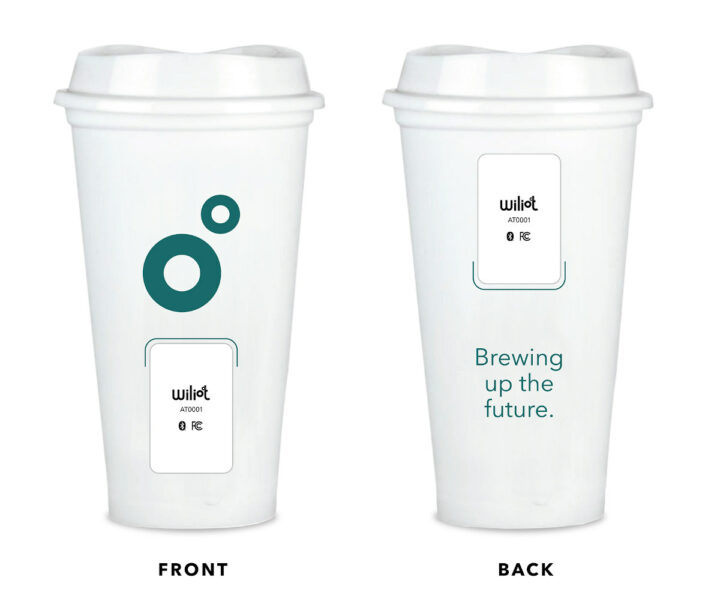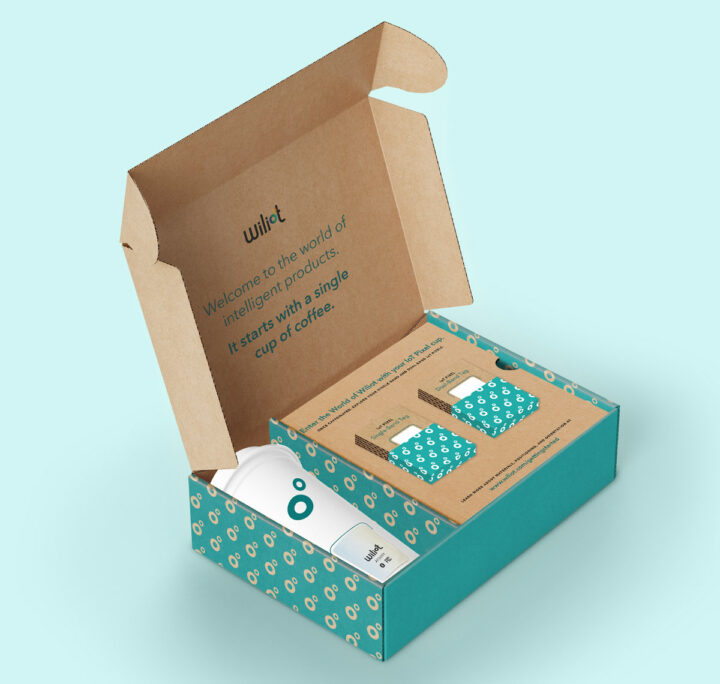Wiliot Starter Kit aims to demonstrate the ability of the Wioliot’s self-powered IoT Pixel and cloud services to retailers with a kit including a Coffee cup that’s capable of tracking liquid temperatures, fill level, motion, location changes, humidity, and proximity.
The kit was previously only available to larger retailers through a “controlled release model”, but the company has now switched to an “open model” so that any retailers can use the technology to track products and packages. Let’s what’s included inside the start kit, and try to understand how the Wiliot solution works.
Wiliot Starter Kit includes the following hardware:
- 1 x IoT Pixel-ready Coffee Cup
- 5 x Single-Band IoT Pixels mounted on cardboards
- 5 x Dual-Band IoT Pixels mounted on cardboards
- 1 x Single-Band Bridge Device
- 1 x Dual-Band Bridge Device
You’ll also get 6 months of Wiliot Cloud Services, access to the Wiliot community forum & support Portal, and early access to the Wiliot Automation Platform scheduled to launch later this year. The kit can be purchased after registration for $500, and there’s a 2 to 3-week lead time.
 We get limited technical information in the press release:
We get limited technical information in the press release:
…the kit also includes small Bluetooth bridge devices that energize and read the IoT Pixel tags. The harvested data is relayed to the Wiliot Cloud via gateways, including smartphones, via the Wiliot mobile app – which is now compatible with iOS and Android devices.
That means IoT Pixels are energy harvesting devices and there is a Bluetooth bridge device (on the table) to power and get sensor data from the IoT pixels. But to get more details, we’ll need to go through the Wiliot Academy (another registration is required).
Ther we learn that the Wiliot IoT Pixel is a stamp-sized “computer” with Wiliot’s 1 MHz Cortex-M0+ Bluetooth 5.x Low Energy microcontroller, 1 KB storage, and sensor interfaces, as well as two 2.4 GHz antenna, one for Bluetooth connectivity and the other to harvesting Radio Frequency (RF) energy. The company further explains the IoT pixel is extremely low-cost to manufacture since they rely on the same process used to make NFC / UHF RFID tags.
The “Wiliot Academy” website is extremely slow and a real pain to use, so I’ve not gone through it all… But still managed to find that the single-band devices should run at 2.4 GHz only, while the dual-band devices will operate in both 2.4 GHz and sub-GHz ISM bands. There does not seem to be any battery on the IoT Pixel modules, so these are only powered by the adjacent BLE-only bridge devices that gather sensor data over Bluetooth LE, which send the said data to a WiFi gateway (which can be an Android or iOS smartphone) connecting to the Wiliot cloud through the Internet.
This can be useful to retailers to locate assets, determine when a customer needs to have his glass filled, gather statistics such as how long do customers stay after finishing their drink, social credit scores (points deducted if you ordered a single drink at Starbucks and squatted there a full day…), when a specific table needs to be cleaned, and so on.
Thanks to TLS for the tip.

Jean-Luc started CNX Software in 2010 as a part-time endeavor, before quitting his job as a software engineering manager, and starting to write daily news, and reviews full time later in 2011.
Support CNX Software! Donate via cryptocurrencies, become a Patron on Patreon, or purchase goods on Amazon or Aliexpress






Why?
They want to track how long you sit without ordering a new drink…
I list some of the use cases at the end of the article.